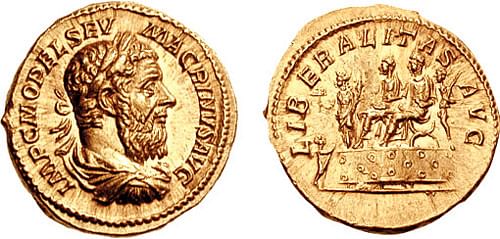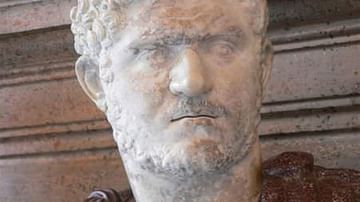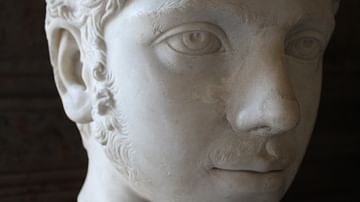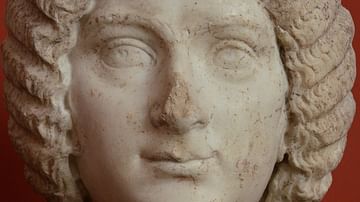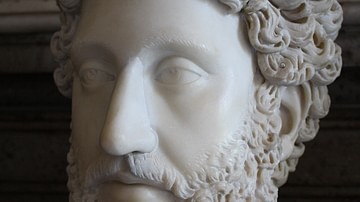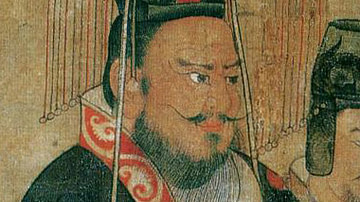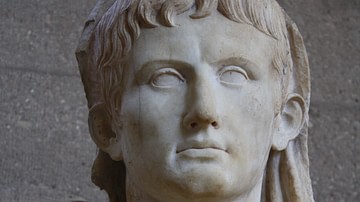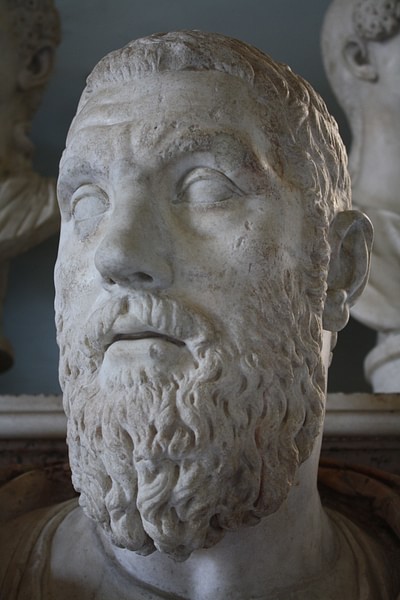
Macrinus was Roman emperor from April 217 to June 218 CE. It is a story that has been told countless times before - an emperor is assassinated leaving no heir or successor. On April 8, 217 CE Roman Emperor Caracalla was murdered, supposedly on the orders of the man who would eventually become his successor, Macrinus. This new emperor, during his 14-month reign, would have two major distinctions - he would never step foot in Rome as emperor, and he would be the first never to have served in the Senate.
Early life of Macrinus
Marcus Opellius Macrinus was born at Caesarea in Mauretania (a province along the northern coast of Africa) in 164 CE (no exact date is known), supposedly of the equestrian class - a class that had at one time provided horses for Rome's army. Historian Cassius Dio wrote,
Macrinus was a Moor by birth, from Caesarea, and the son of most obscure parents, so that he was very appropriately likened to the ass that was led up to the palace by the spirit; in particular, one of his ears had been bored in accordance with the custom followed by most of the Moors. Bur his integrity threw even this drawback into the shade.
Luckily for Macrinus, he would rise above his low class birth and receive training as a lawyer. In his Roman History Cassius Dio added, “As for his attitude toward law and precedent, his knowledge of them was not so accurate as his observance of them was faithful.” This latter comment gave indication of the future emperor's actions.
Macrinus & Emperor Caracalla
Little else is known of Macrinus until the reign of Emperor Septimius Severus (193 – 211 CE). Plautianus, the commander of the Praetorian Guard, named him as a steward. Later, in 212 CE under Emperor Caracalla, he would rise to become the Praetorian Guard commander himself. This position afforded him the opportunity to serve under Emperor Caracalla as second in command against the Parthians in the east. However, the sometimes moody and unpredictable emperor began to fear the ambitious Macrinus, having heard rumors that a soothsayer predicted that the commander would soon become the emperor. Realizing that his time as emperor was threatened, Caracalla allegedly ordered the execution of Macrinus. It was then that the commander decided he must either kill the emperor or be killed himself.
When the often disliked emperor travelled to visit the temple of the moon goddess Luna near Carrhae, Macrinus seized the opportunity. On April 8, 218 CE as Caracalla stopped along the roadside to relieve himself, one of his bodyguards came up behind him with sword in hand and stabbed the unsuspecting emperor. Macrinus returned to camp with the body of Caracalla, claiming he had already killed the emperor's murderer. Caracalla's ashes were sent to Rome and interred in the Mausoleum of Hadrian. According to the Herodian's History of the Roman Empire, the Senate was elated:
…the cheering Senate voted Macrinus all the imperial honors, the fact is, however, that they rejoiced not so much at Macrinus' succession as at their own deliverance from Caracalla. Every man…felt that he had escaped a sword suspended over his head.
Macrinus As Emperor
Immediately after assuming the throne - it would take three days before being proclaimed emperor -Macrinus went on a purge, replacing many of the provincial governors as well as executing anyone who appeared to threaten his claim to imperial power. However, during this purge, the new emperor angered many of those in the army who had been loyal to Caracalla. His actions also infuriated Septimius Severus's second wife and Caracalla's mother, Julia Domna, who had wished to maintain some influence on the throne. Sensing that she could be a threat to his authority, Macrinus ordered her to leave Antioch. She refused. Instead of acquiescing to the emperor's orders, and while suffering the effects of breast cancer, she starved herself to death. Her sister Julia Maesa and two nieces, Julia Soaemias and Julia Mamaea, vowed to carry on her fight.
Throughout his one-year reign, Macrinus continually battled the military, especially after he had retracted many of the benefits awarded by Caracalla. About this same time, the Parthians began to rebuild their army and advance towards the Roman position. At Nisibis in northern Mesopotamia they met the Romans in battle. Instead of fighting, however, the emperor bought a peace settlement, something that further alienated the emperor and his army. Herodian wrote,
…circumstances increased their irritation, still living in tents and sometimes short of supplies in a foreign land, even though a state of peace seemed to exist, they longed to return to their regular stations. When they saw Macrinus' luxury and laxity, they rebelled and spoke bitterly about him, praying for even a flimsy excuse to rid themselves of this annoyance.
The army would soon have their wish granted.
With discontent in the army on the rise and many still mourning the death of Julia Domna, Julia Maesa seized the opportunity to parade a young fourteen-year-old boy named Varius Avitus Bassianus (her grandson) as the rightful heir to the imperial throne. As the descendant of the high priest to the sun god Elegabal, he was “chosen by god” as the lawful successor. Rumor circulated that he was the illegitimate son of Caracalla, and to further increase his claim, his name was linked to the former emperors Marcus Aurelius and Antonius Pius.
Exile & Death
With support of the army, this young man, who would become known as Elagabalus, was smuggled into the camp at Raphanaea, and on May 18, 218 CE, the Third Gallic Legion proclaimed him emperor. Macrinus was a marked man, but his demise had already been predicted by a number of omens. Cassius Dio wrote,
'Macrinus was not destined to live long, either; indeed it had been foretold to him. For a mule gave birth to a mule in Rome and a sow to a little pig with four ears, two tongues, and eight feet, a great earthquake occurred, blood flowed from a pipe, and bees formed honeycomb in the forum Boarium.'
In June of 218 CE, after having been defeated by rebels near Antioch and failing to gain the support of either anyone in the army or in Rome - even with the promise of money - Macrinus fled from Antioch in disguise, shaving his head and beard. He tried to cross the Bosporus at Chalcedon and make it to Rome, a city that was already suffering from the ravishes of flood and fire. He was captured, executed and beheaded. Herodian wrote of this failed escape, “…Macrinus failed to elude his pursuers and met an ignoble end a little later while striving to get to Rome, where he should have gone in the beginning. Thus he owed his downfall to bad judgment and bad luck.” His young son, nine-year-old Diadamenianus, who had been raised to the rank of augustus just days before, was captured at Zeagma in Syria and killed. Cassius Dio discussed the end of the emperor, “…he (Macrinus) made off like a runaway slave through the provinces that he had ruled, and was arrested like some robber by the first comer…”
